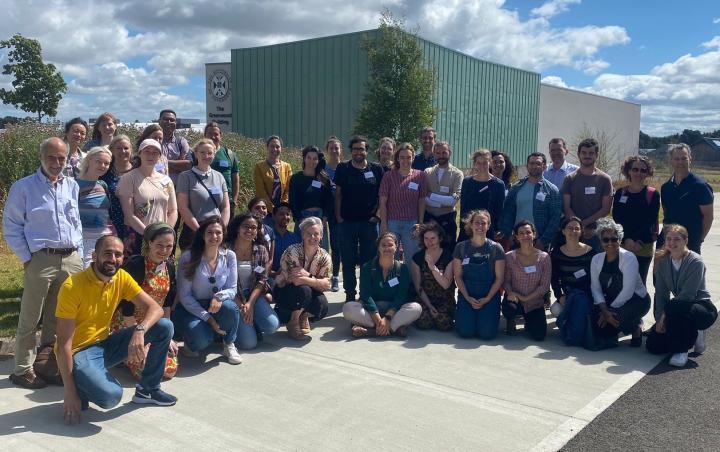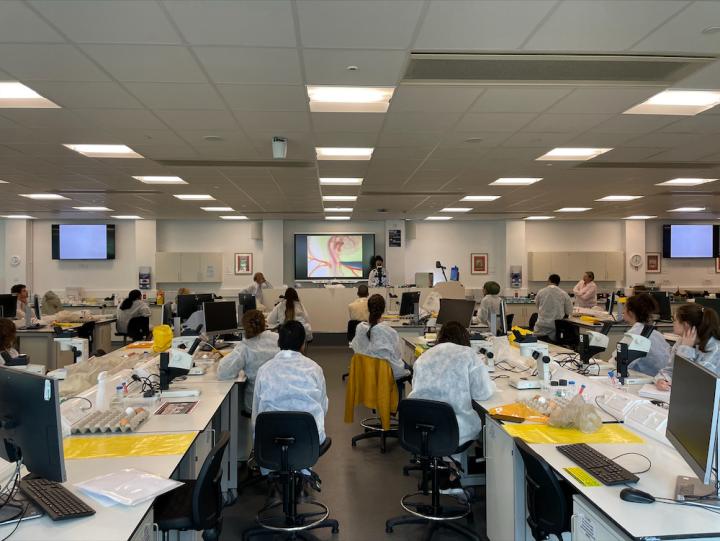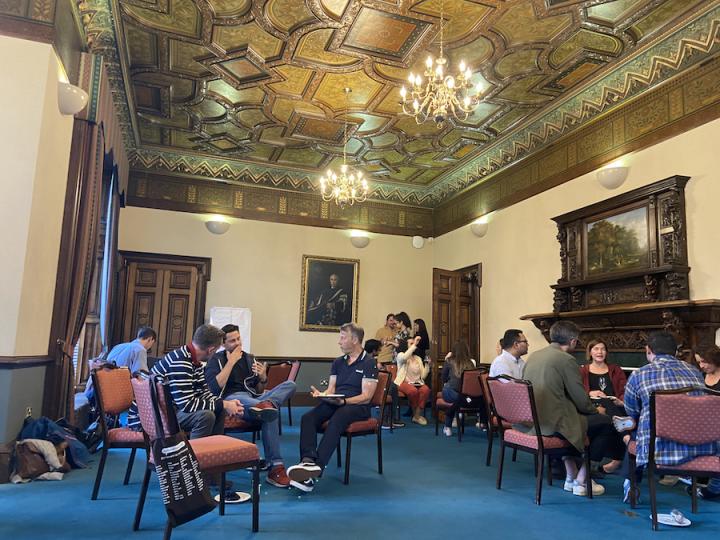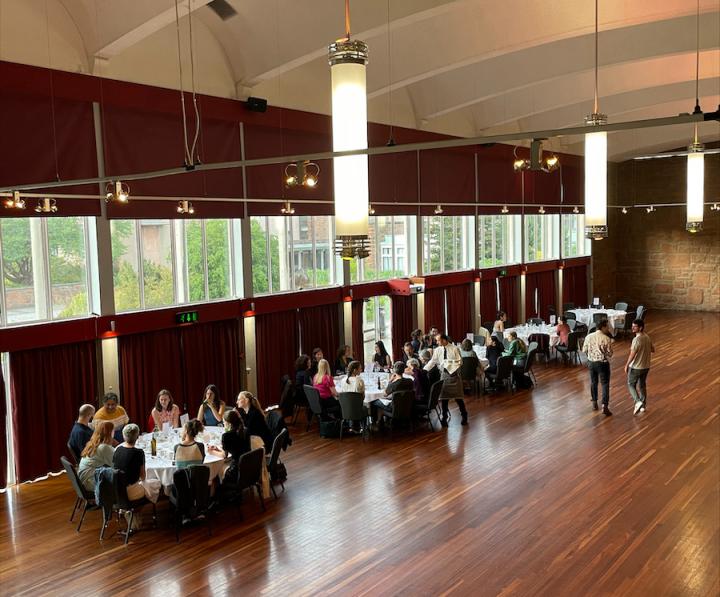EGGED 2022 The Edinburgh Gallus Genomics and Embryonic Development Workshop
Bringing together the world’s chicken embryology researchers and showcasing new technological leaps in the chicken embryo

40 attendees including graduate students, post-docs, group leaders and researchers from industry, travelled from 19 Universities and 10 countries to join the first ever Edinburgh Gallus Genomics and Embryonic Development (EGGED) Workshop on July 12-15th 2022 (Fig. 1). EGGED was held at the Roslin Institute and the Royal (Dick) School of Veterinary Studies (R(D)SVS) on the Easter Bush Campus, just outside of Edinburgh, Scotland’s capital city.
A packed programme of lectures and hands-on sessions
The chicken embryo is currently having a resurgence as a premier model organism in developmental biology based on some impressive technological advances in gene editing, transgenesis and surrogate host technology. EGGED was developed to bring together the power of these new approaches with that of the undisputed ‘traditional’ embryological strengths of the chicken embryo. Open to any applicants interested in using the chicken embryo, the EGGED Workshop brought together scientists from all career stages, from doctoral students to expert group leaders looking to expand the use of the chicken embryo within their research. EGGED was generously supported by ten invited speakers from the UK that appeared in person and three from the EU and USA, who presented online. The workshop was also made possible by the hard work of a team of students, postdocs and technicians from The Roslin Institute.
The four-day workshop gave the participants a chance to get hands-on experience with a variety of chicken embryological approaches through guided and self-led practical sessions in the state-of-the-art teaching labs at the R(D)SVS (Fig. 2). The days began with talks demonstrating different chicken techniques by leaders in the field such as Prof. Claudio Stern, Prof. Neil Vargesson and Prof. Tatjana Sauka-Spengle, presenting on subjects such as embryo staging, teratology and gene network analysis in ovo. This was followed by opportunities for participants to try out many of these approaches for themselves.
Early Career Researchers including Dr. Ben Steventon, Dr. Raman Das, Dr. Ruth Williams, Dr. Ashley Libby and Dr. Julia Oh, also presented and led practical sessions. To complement the embryological approaches, lectures were given by Prof. Mike McGrew, Dr. Jacqueline Smith, Dr. Joe Rainger, Dr. Jérôme Gros and Prof. Hervé Acloque on a range of subjects important to developmental biologists, like the chicken genome, functional genomics, transgenesis and genome engineering approaches.
A model is only as good as its community of users. EGGED has helped connect, shape and support an emerging community of exciting and collaborative scientists

From fundamental techniques to new approaches
The skills on offer were extensive and wide-ranging, including fundamental techniques, such as tool making, staging and dissection, the addition of proteins and chemicals to chicken embryos, tissue grafting, the use of beads to apply factors, and ex ovo culture techniques. With the support of Zeiss and Molecular Instruments, there were also sessions on HCR Fluorescent RNA In Situ Hybridisation and Lightsheet microscopy.
Exploring new technological advances in the chicken embryo: A chicken renaissance?
Uniquely, attendees could use eggs from the fluorescent reporter transgenic lines available from the National Avian Research Facility (NARF) at The Roslin Institute, and learn more about how they are currently being used for research. For example, Dr. Julia Oh described her project using chicken embryos from the Chameleon line (a Cre inducible minibow reporter) to understand limb development, and Dr. Ashley Libby, a post-doctoral researcher, outlined how she uses the Chameleon line to examine neural tube development. Dr. Joe Rainger, a UKRI Future Leader fellow using gene editing in chicken embryos to study human eye development, highlighted how he uses gene editing in the chick embryo to expedite developmental eye research.
Participants also learned about recent advances in the production of novel gene-edited and transgenic chicken lines from Prof. Mike McGrew, including sterile surrogate host technology and primordial germ cell (PGC) isolation and culture. Members of the McGrew lab, Dr. Sudeepta Panda and Dr. Jun Hu also demonstrated CRISPR/Cas9 construct design and PGC injection, respectively.
These sessions sparked information sharing about other resources being developed in quail. For instance, an attendee Dr. Hila Barzilai-Tutsch, a postdoctoral researcher, gave an impromptu presentation about her work on the development of optogenetic-based gene activation in quail. Ultimately leading to a multitude of exciting ideas of what new gene-edited chicken and quail lines could be next.

Shaping the future of chicken developmental biology
The EGGED workshop was a long-time ambition for the lead organiser Dr Megan Davey, who shared “A model is only as good as its community of users. EGGED has helped connect, shape and support an emerging community of exciting and collaborative scientists".
EGGED was not only an opportunity for scientists to develop their skills, and learn about recent advances, but also a place for the chicken developmental biology community to come together. This was helped by including an opportunity for attendees to share their research by bringing posters along to display and discuss throughout the workshop, and by hosting a Brainstorming evening on the penultimate night of the workshop (Fig. 3). The Brainstorming evening was a great success, with lively debate and discussion on the future of chicken developmental biology resources and approaches, and how best to aid community building.
The workshop also created connections with relevant industrial partners, like Aviagen and Cobb-Vantress, both leaders in broiler chicken genetics. Helping build links between chicken developmental biologists and potential industrial partners.

Ending EGGED 2022 on a high note
The final night of the workshop ended on a high, with a Dinner (Fig. 4) and Ceilidh (traditional Scottish group dancing). The Ceilidh was thought to be a particularly apt ending, as some of the group dances neatly illustrate the process of gastrulation in the developing chicken embryo. We will test the new adage, Scientists that dance together, collaborate together!
The EGGED Workshop will return in 2024!
EGGED 2024 will be hosted at the Roslin Institute next year in July 2024.
Would you like to attend next year? For more information on registration and next year’s programme follow this link
Organisers
Dr Megan Davey is a Group Leader at The Roslin Institute, her research examines the causative alterations of gene expression which lead to variations in phenotype using comparative anatomy, genomics and embryonic manipulation of avian species, with a particular interest in the molecular anatomy of the developing limb bud.
Dr Lindsay Henderson is the Academic Liaison for the National Avian Research Facility (NARF) at The Roslin Institute. A primary aspect of her role is to build connections with the research communities that use the NARF’s resources and to support these research communities through sharing information and gathering feedback to help inform resource development.
Get in touch with us:
Funding
EGGED 2022 was generously supported by The Roslin Institute, R(D)SVS and the National Avian Research Facility. The organisers received a Saltire Facilitation Network Award from The Royal Society of Edinburgh to hold these practical workshops in both 2022 and 2023. Scientific Meeting Grants from The Company of Biologists and the Genetics Society were also awarded to hold the EGGED workshop in 2022.
The EGGED 2022 workshop was sponsored by Molecular Instruments and Aviagen.


